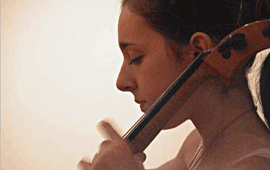> [Archived] Chronicles

Cristina Basili, 'Spring Voices' and the Wiener Jeunesse Orchester
On Friday, 9th August, the 2013 'George Enescu and the Music of the World' International Festival - the 16th edition - presented a chamber music recital given by Cristina Basili - cello (Austria), accompanied on the piano by Marco Basili. This also enters into the category of music in the family, the daughter, aged 19, and the father performing in a wonderful programme that brought together some of the most difficult works for cello: Cello Sonata Op. 102 No. 1 by Beethoven and Op. 99 No. 2 by Brahms, Debussy's Sonata and The Suite for Cello Solo by Cassadó. A student of the famous Brazilian cellist Antonio Meneses, Cristina Basili, whose origins are a mix of Greek and Austrian blood, showed not only virtuosity, but, more importantly, a deep knowledge and understanding of the score, not an easy feat given the choice of composers. If technical acrobatics are no longer a surprise in tender years, making music for real remains a possibility only for the talented. And the cellist Cristina Basili is certainly one of them.
The chamber music recital had a hint of originality, given by the attempt to fuse music and image. Paul Andrei Iordache proposed a video montage which was projected on a screen situated behind the interpreters. Without denying the beauty of the images and the originality of the conception, I confess that, personally, I would have wanted to listen to the music without the visual aids that, in the case of Beethoven and especially Brahms, sometimes disturbed the audition, distracting us from a brilliant music which is self-sufficient.
On the initiative of the 'Bianca' Cultural Foundation (Bianca Manoleanu), this year's edition of the 'Enescu and the Music of the World' International Festival had an additional attraction: a master class held by the soprano Maria Diaconu and the pianist Ursula Ruttimann from Geneve, two personalities well established in the international music life; they brought to Sinaia their love, their experience of brilliant careers, passion and knowledge necessary to educate young voices, using all these during the courses held at George Enescu's villa in Cumpătu. Thirteen young artists from China, Korea, Cyprus, Spain and Romania participated in this master class; they are either students or future students of the National University of Music in Bucharest. In the end, the focus of this class which lasts two weeks was more on the artistic interpretation than on the technical component. And even if the voices were very different in terms of quality or stage of development, the 'stamp' of the two professors was strongly felt in the manner of singing, understanding, living and transmitting the music. The 13 artists performed together in a first concert in the Music Room of the Peles Castle in Sinaia (on Saturday, 10th August) and they will sing again in front of an audience on the afternoon of Wednesday, 14th August at the 'Aurel Stroe' Cultural Centre in Busteni. The performances of the sopranos Stanca Maria Manoleanu and Maria Mirabela Popescu and that of the Chinese tenor Fang Shuang deserve special mention.
On Sunday evening we had the joy of listening again to the Wiener Jeunesse Orchester in the Casino Hall in Sinaia; the orchestra was conducted by Herbert Bock and it presented an ambitious programme comprising Gustav Mahler's 'Blumine' Movement, Wolfgang Sauseng's Four Songs for Baritone and Orchestra with the baritone Dominik Köninger from Berlin as soloist and Anton Bruckner's Symphony No. 7 (WAB 107). The ensemble has approximately 100 persons, high-class instrumentalists aged between 18 and 26. 'Moulded' at the Austrian music school, the orchestra pays special attention to the refinement of the interpretation, adopting a flexible and coloured manner of making music. The repertoire was chosen to answer these intentions and, even if Bruckner's Symphony, lasting more than an hour, turned out to be, in terms of understanding and interpretation, a little too difficult given the orchestra's youth and experience, there is nothing that we could reproach with the rendering of the score, either technically or artistically.
I would like to highlight the incredible performance of the young German baritone Dominik Köninger in a first audition, the work Four Songs for Baritone and Orchestra written by the contemporary composer Wolfgang Sauseng, using the lyrics of four poets, one of them being Paul Celan.
This was only the first week of the 'Enescu and the Music of the World' International Festival, the 2013 edition. The concerts and recitals will continue until 20th August. We'll be listening to Valentin Gheorghiu, Liviu Prunaru, Maruxa Llorente, Cristian Ifrim, Dorin Marc, Marin Cazacu, Valentina Prunaru, Andrei Licareț in Sinaia. The closing concert will be performed by Moldova's National Youth Orchestra.
Translated by Mihaela Olinescu and Elena Daniela Radu
MTTLC, The University of Bucharest














